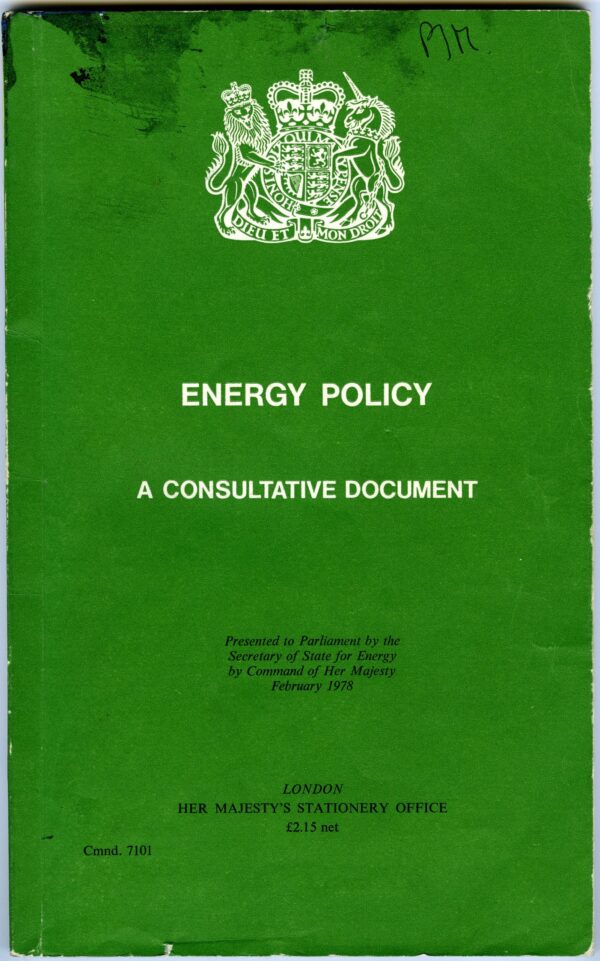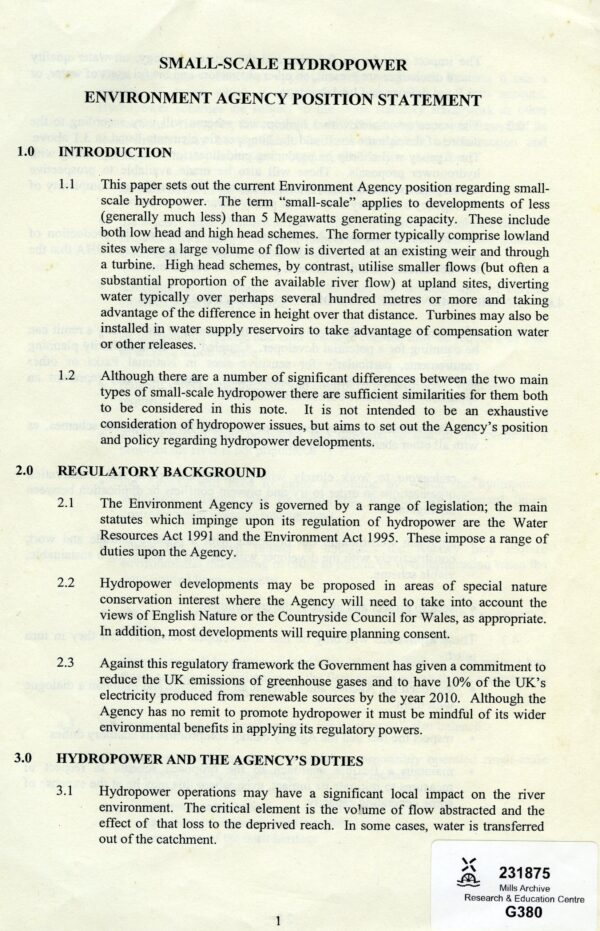Secretary of State for Energy (Benn, Tony)., Energy Policy: A Consultative Document (London, 1978)
A ‘Green Paper’ presented to Parliament by the Secretary of State for Energy, by command of Her Majesty in February 1978. The document is a general look into energy types and usage in the UK and the Government’s energy strategy proposals for the future. The forward claims a recent growth of interest and awareness of energy, for not only the reader but future generations, justifying the need for this framework of national energy strategy. A review of all of the current energy sources is given, remarking on its, consumption rate, price, environmental aspect etc. Policy for these sources going forward is discussed in terms of its environmental effect, keeping up with consumption etc. Interestingly, it later broaches the subject of renewable energy, analysing the potential productivity, how much funding would render it efficient and potential impacts of such sources. It is an interesting source to gauge knowledge and opinion about the UK and its energy sources in the 1970s.
A review of an investigation which looked into the effects of wind developed energy on the Danish economy over a span of 5 years. It claims to have resulted in considerable financial savings for the Danish people. The review also notes on the positive points omitted from the report, such as ; fuel savings, reduction of air and water pollution, and personal and social benefits of the transition from unemployed to an employed situation. It lists the conclusions drawn from the report, again reiterating employment benefits, a surplus foreseen in the future and interestingly, the fact that Denmark’s trade balance is less due to the money put into this investigation. Two tables at the end demonstrate WECS exports net revenues in the Billions, and, Foreign currency savings from Home-Marketed WECS.
Ros Davidson’s article, “Environmental Issue In Need Of Reality Not Romanticism”, discusses the clashes between wind power development, and local groups of opposition. Tension between the public and wind energy, she argues, would need to be resolved if more wind turbine sites were to be developed.
The article provides arguments from multiple groups of concern, including residents and environmentalists. Davidson provides an insight into these groups’ perspectives, taking quotes both in favour and against wind power development. Regarding environmentalists, an argument is made on behalf of the birds of prey (golden eagles) that are at risk of being killed by the turbine blades. As these birds of prey are protected under federal law, the issue of violating legislation arises. However, Davidson also presents a counterargument, noting that birds are also killed by electrical lines and highways, thus making them no safer for birds than wind turbines.
Residents become some of the most difficult and vocal opponents to wind power, with their issue of romanticism. Davidson states in her article that the public often have an idealised perception of pastoral America, reminiscent of their frontier past, though this is, she considers, unrealistic, as humans have been shaping the landscape of the United States since they first arrived from Europe. The construction of wind power sites would be no different. Residents, Davidson argues, are also against the aesthetics of wind energy, suggesting that the noise and view of these turbines would ruin their romanticised perception of the American countryside.
Davidson concludes her article with the suggestion that the wind industry should reduce the visual and environmental aspects of wind turbines, regarding their impact on the surrounding geography and natural landscape.
This is a four-pieced document from the Environment Agency assessing small-scale hydropower installations. It details the factors of which the Agency will take into account when considering hydropower systems. This analysis has been needed as the government has given a commitment to reduce the UK’s emissions of greenhouse gas and have 10% of the UK’s electricity produced from renewable sources by 2010. Therefore, the contribution that hydropower could make has been called to be assessed. It first tackles the legal issues which the Environment Agency may face. It recognises the fact that they mustn’t breach upon local planning and permission, therefore claiming that they will do such things as work with local authorities, maintain an open dialogue, be sustainable, flexible and most importantly, improve the environment. Next, it goes on to list what the key issues that the Agency are likely to face. These bullet points list things such as an assessment of environmental impact and make sure that the schemes are robust and fail-safe. Then it goes on to list the possible benefits to the river in case of adversity, claiming environmental, economic benefits to locals and the bigger goal of reducing global gas emissions. The policy concludes that the Environment Agency supports the government’s targets and that it recognises the contribution which hydropower schemes could make in reducing emissions. They additionally conclude that they recognise the potential benefits of small-scale hydropower to rural communities in meeting needs for power. However, where a proposed scheme is inappropriately placed, the Agency will guide.



